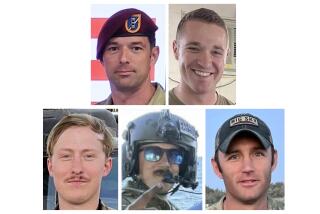Fight Against Ulster Terror on Track Despite Setback : Northern Ireland: The deaths of 25 officers in a helicopter crash had raised fears for British security.
- Share via
LONDON — Britain’s campaign against terrorism in Northern Ireland suffered an enormous setback early this month when 25 senior officers in the security establishment were killed in a helicopter crash in Scotland.
The officers, along with four crew members, died en route from Belfast to Inverness for a top-secret security conference and a major review of the efforts to end violence perpetrated by members of the separatist Irish Republican Army.
In an instant, the anti-terrorism forces lost senior officers of the Royal Ulster Constabulary, which is Northern Ireland’s police force; of the government’s police intelligence arm, called the Special Branch; of the internal security agency known as MI-5, and of the intelligence division of the British army.
At first, Northern Ireland security experts suggested the officers were irreplaceable and that the government’s war against the IRA and Unionist paramilitary forces would be severely hampered. In effect, it was suggested, the “high command” in the war against terrorism in Northern Ireland had been wiped out.
But nearly three weeks later, Northern Ireland officials say, the dead officers have been replaced and the campaign against the IRA and other illegal organizations in the province of Ulster has resumed unabated.
Authorities have established that the June 2 crash of the Boeing-built Chinook helicopter was not caused by sabotage--though whether it was due to pilot error in bad weather or to mechanical failure has not been determined.
“Obviously, we have experienced a deep sense of loss,” said one official in Britain’s Northern Ireland Office. “And it has left huge gaps. But our security structure is something like the army’s. There are other officers ready to step up and fill those vacant posts.”
Further, officials say that most of the information carried by those killed in the crash is contained in the computerized files of the Northern Ireland Office, the police and the army.
“It is not as if these senior officers carried secrets to the grave with them,” said an official in Belfast. “For years, the security policy here has been for the left hand to let the right hand know what it is doing.”
But the unexplained decision to place 25 senior officers aboard a single helicopter for a long flight, over water, from Belfast to Inverness has been strongly criticized.
“That decision has damaged morale,” one Belfast-based diplomat said. “You wonder how anyone could have made such a stupid decision. And these, after all, were the cream of the . . . intelligence establishment.”
The security machine in Northern Ireland is enormous. The Royal Ulster Constabulary has about 12,000 members, the British army another 12,000; there are 6,000 members of the local army militia and 3,500 in the prison service.
Northern Ireland experts point out that while the loss of senior officers was grievous, those officials would not have had day-to-day involvement with informers--a practice that lies at the heart of the anti-terrorism operation.
“One or two of them might have been the contact for a top-level informer,” said one Ulster specialist. “But by and large, such contacts are handled by lower-level officers.”
The breadth of the Northern Ireland operation was explained last week when MI-5 head Stella Rimington revealed on television that her agency now devotes three-quarters of its efforts to counterterrorism activities, and nearly half to Irish terrorism.
MI-5, also known as the Security Service, is a cross between the FBI and the counterintelligence arm of the CIA. Like the CIA, it has no powers of arrest.
“Over the past 18 months,” Rimington said, “more than 20 Irish republican terrorists have been arrested in Great Britain and charged.
“In Northern Ireland, the security forces prevent four out of five terrorist attacks which are attempted,” she added.
More to Read
Sign up for Essential California
The most important California stories and recommendations in your inbox every morning.
You may occasionally receive promotional content from the Los Angeles Times.













